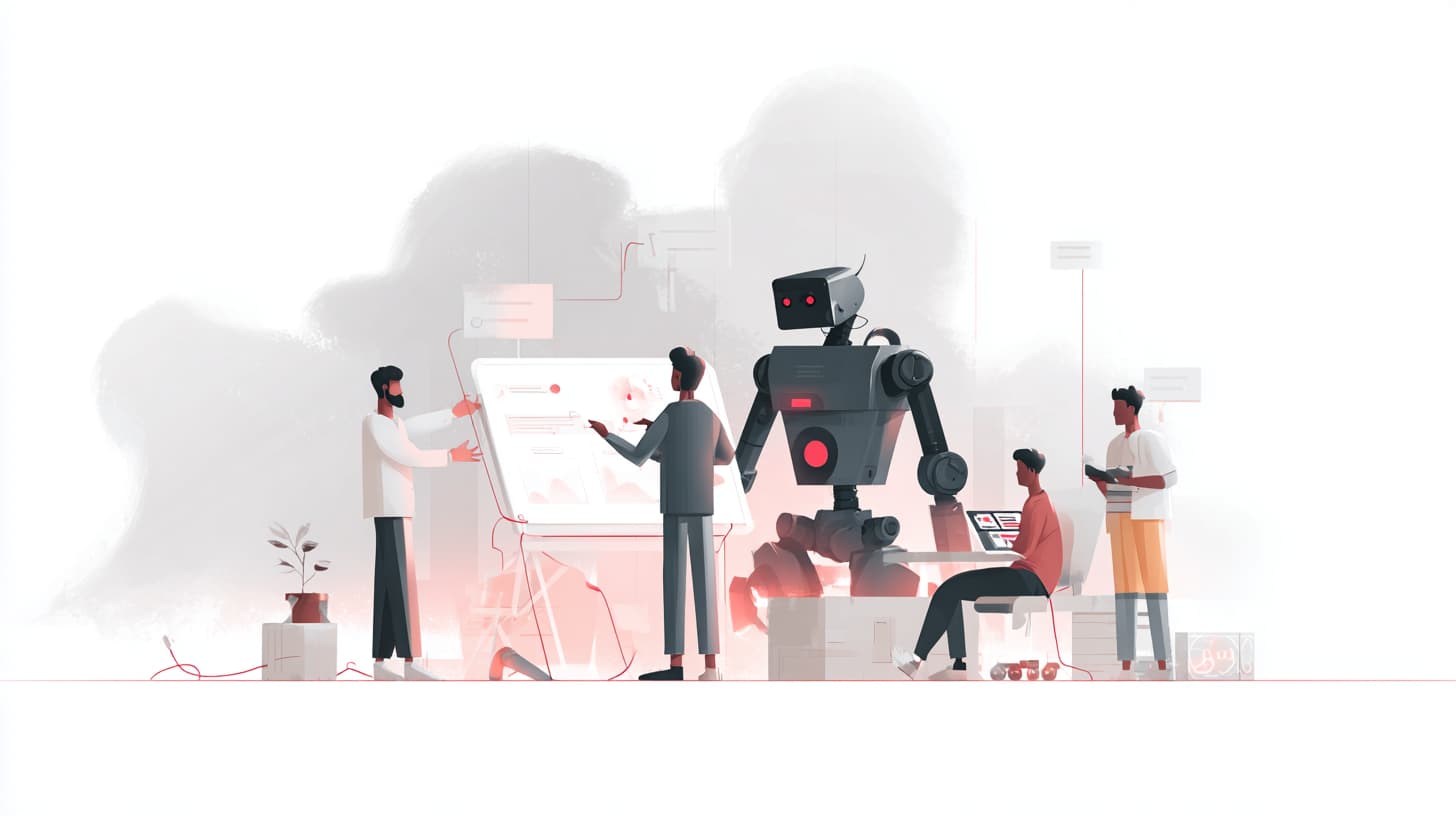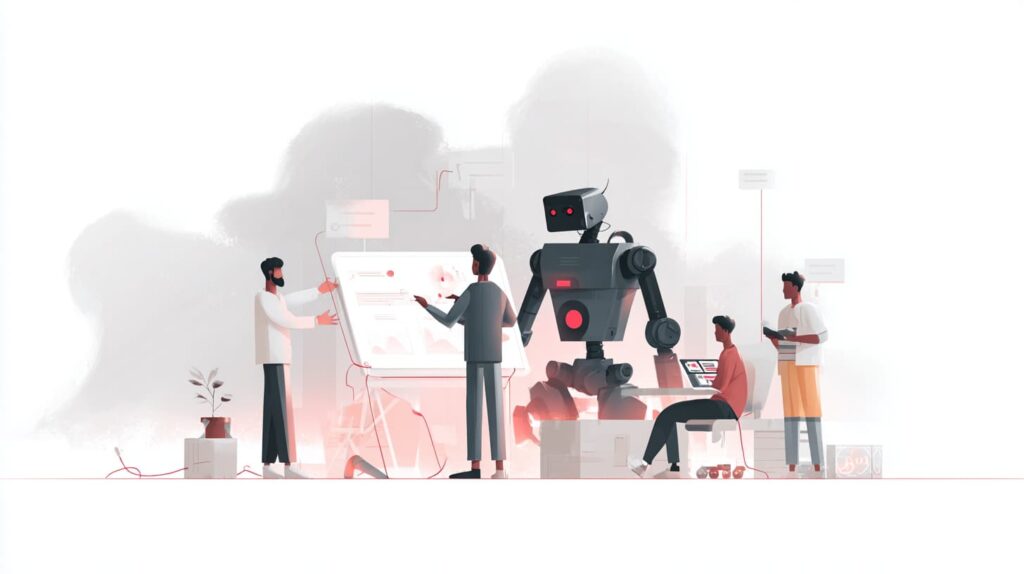Por EloInsights
- HR is shifting from a purely operational role to a more strategic function, supporting leaders and teams in tackling complex business challenges.
- Generative artificial intelligence (Gen AI) emerges as a solution to automate repetitive tasks, free up time, and allow greater focus on high-impact decisions.
- Learn how EloGroup has helped major companies incorporate AI into their operations, making their HR departments more strategic.
The role of Human Resources within organizations has been undergoing profound transformations. Historically focused on operational tasks, HR is now being called upon to assume a more strategic position, aligning directly with business objectives and supporting leaders, managers, and teams in challenges that go beyond its traditional scope.
According to Gartner data, 61% of HR leaders report a significant increase in strategic demands, such as supporting the effectiveness of leaders and teams, redesigning work models, and driving technological innovation. However, paradoxically, 75% of these leaders’ time is still consumed by tactical and transactional tasks, creating a dilemma: how can they balance these operational responsibilities with growing strategic expectations?
It is in this context that generative artificial intelligence (Gen AI) emerges as a powerful solution to redefine HR. Recent studies show that 63% of HR leaders see Gen AI as a “key lever” to improve operational efficiency, enhance employee experience, and significantly reduce costs. Moreover, 34% of these leaders are already actively exploring potential use cases and opportunities that the technology offers, as highlighted by Gartner (2023). Gen AI has the potential to automate repetitive tasks, free up time for strategic initiatives, and answer complex questions with precision, allowing HR to focus on high-impact decisions.
However, there is a challenge: only 4% of HR leaders have a well-defined strategy for effectively implementing AI, according to a study by LinkedIn and Josh Bersin. This gap is even more concerning when we consider that, according to the Harvard Business Review, between 80% and 85% of AI projects fail—a rate almost twice as high as the failure rate for corporate IT projects a decade ago. These numbers reveal a scenario of great potential, but also significant uncertainty, where the lack of a structured approach can lead to wasted resources and disappointing results.
In this article, we will explore how EloGroup is helping global companies unlock the potential of Artificial Intelligence in HR, overcoming the dilemma between operational and strategic priorities, and delivering solutions that transform people management.
Business Challenges and Opportunities for the Use of AI in HR
The Human Resources sector faces a series of challenges that, while complex, open up a vast field of opportunities for the application of Gen AI. Two of the main obstacles identified by companies are the enormous volume of internal information—such as policies, manuals, and corporate communications—and the fact that this information is not always documented, and, when it is, it is often in unstructured data formats.
This is where Gen AI comes in as a catalyst for transformation. For example, the technology can facilitate access to critical information by answering employees’ questions about benefits, HR processes, or internal policies quickly, accurately, and in a personalized manner through the use of intelligent chatbots. It also allows managers to complete tasks via conversational workflows, such as approving requests and performance reviews, reducing the time spent on manual and repetitive activities.
Other opportunities include digital and data-driven recruitment, where Gen AI can automatically generate job descriptions, identify target skills, and analyze candidate responses in video or text-based interviews, as well as offer chatbot support for new hires. In corporate learning, the technology can personalize training by suggesting content, creating interactive materials, and adjusting modules based on employees’ goals and competencies. In people analytics, Gen AI can use structured, semi-structured, and unstructured data to predict knowledge gaps, identify emotional or engagement needs, and even facilitate stress management during critical moments.
These challenges and opportunities show that AI is not just a tool for automating tasks, but a means to transform HR into a strategic business partner—aligning operational efficiency with innovation and long-term results. At EloGroup, we believe that deeply understanding these aspects is the first step in designing solutions that truly make a difference.
A Strategic Approach to Implementing AI in HR
Implementing Gen AI in Human Resources is not a simple task. However, with the right approach, it can be transformative for organizations. At EloGroup, we believe that the success of this implementation depends on a business-driven strategy structured around three key pillars: Business Challenge, Analytics Solution, and Technology Foundation. This methodology, developed based on our transformation experience, ensures sustainable results aligned with the strategic objectives of companies.
- The first step is to deeply understand the business challenges. We start with a clear objective based on the organization’s specific challenge—whether it’s the high volume of policy documents or the need to free up time for HR leaders to focus on strategic initiatives. We define metrics directly linked to the business outcomes the company aims to achieve, such as cost reduction, increased efficiency, or improved employee experience. It’s essential to recognize that Gen AI is not the answer to every problem; it should be part of a broader set of strategies, never the sole solution.
- Next, we design the analytics solution, preparing a robust environment to explore data and develop models that address specific needs. This involves steps like exploratory data analysis, modeling, and algorithm refinement. For example, in the case of an intelligent chatbot, we use foundational models (such as Large Language Models—LLMs) with Retrieval Augmented Generation (RAG) to provide accurate and reliable answers, while ensuring that the solution is scalable (for example, to other languages), with a solid data architecture and models carefully selected for the problem at hand.
- Finally, we build a secure and efficient technology foundation. This includes integrating systems (data ingestion, processing, and storage), using scalable tools aligned with business strategies (such as opting for cloud infrastructure), and ensuring data protection at every stage. At EloGroup, we believe the client should have the autonomy to choose the tool provider that best fits their needs, so we take an agnostic approach—leveraging the best platforms in the market without exclusive commitments, always focusing on finding the ideal solution for each client.
This integrated approach, combined with our expertise in more than 200 People & Organization projects, positions us as ideal partners for companies seeking to transform HR with Gen AI. By following these steps, we avoid the high failure rates of AI projects and deliver real value, from strategy through execution.
Case Study: Transforming HR with Gen AI
The practical application of Gen AI in Human Resources can deliver transformative results, as demonstrated by a successful case implemented by EloGroup for a client operating in Latin America. This example shows how Gen AI can solve complex people management challenges, delivering both operational and strategic value.
The client, a global company with over 600 employees in Brazil, faced a significant challenge: a large volume of internal policy documents and high demand for support in internal service areas. The complexity of these policies, combined with the need for quick and accurate responses to employee questions, overloaded HR teams, impacting efficiency and compliance in a highly regulated sector. To address this, EloGroup developed a conversational solution (an intelligent chatbot) designed to answer questions based on manuals and internal policies, using advanced Gen AI technologies.
The solution was structured in three main stages:
First, we carried out data collection and processing, using OCR (Optical Character Recognition) and other techniques to enable the capture of content from manuals and policies, as well as transforming this data into vectors (embeddings) for easier later use.
Next, we used a language model (LLM), applying prompt engineering and Retrieval-Augmented Generation (RAG) techniques, allowing the intelligent chatbot to search for relevant information in the knowledge base (manuals and internal policies) before generating a response. This ensures more accurate, contextualized answers aligned with the organization’s content.
Finally, the solution was implemented in the company’s collaboration software, allowing employees to interact directly with the intelligent chatbot in a system with which they were already familiar.
Result: The intelligent chatbot achieved an accuracy of 82% in its responses, with a high level of confidence, as validated in tests with 589 questions. In fact, performance tests showed that 484 answers were correct, demonstrating the chatbot’s ability to handle even non-specific questions that would normally be answered manually. This solution not only reduced the time HR teams spent on repetitive tasks but also improved compliance and the employee experience, enabling HR to focus on strategic initiatives.
The Future of HR with AI: Next Steps and Benefits for Your Business
Artificial intelligence is redefining the role of Human Resources, transforming HR from an operational function into a true strategic partner for the business. As organizations continue to navigate a rapidly changing environment—with growing demands for efficiency, employee engagement, and innovation—Gen AI offers a promising horizon for the future of HR.
At EloGroup, our transformation expertise, accumulated since 2007, enables us to help major global companies—including Fortune Global 500 clients—successfully implement AI solutions. With around 700 professionals operating in Brazil and internationally, in alliance with Cordence Worldwide and in 19 countries across the Americas, Asia, Europe, and the Middle East, we work with the leading data and artificial intelligence technology providers, such as Microsoft, Amazon, Google, and Oracle, following the most rigorous standards to protect sensitive data and ensure scalability.
Our agnostic approach allows us to create customized solutions for each client’s unique challenges, ensuring that our main mission is to find the best tools to meet your organization’s specific needs.
Ready to explore how AI can transform HR and other areas of your company?











